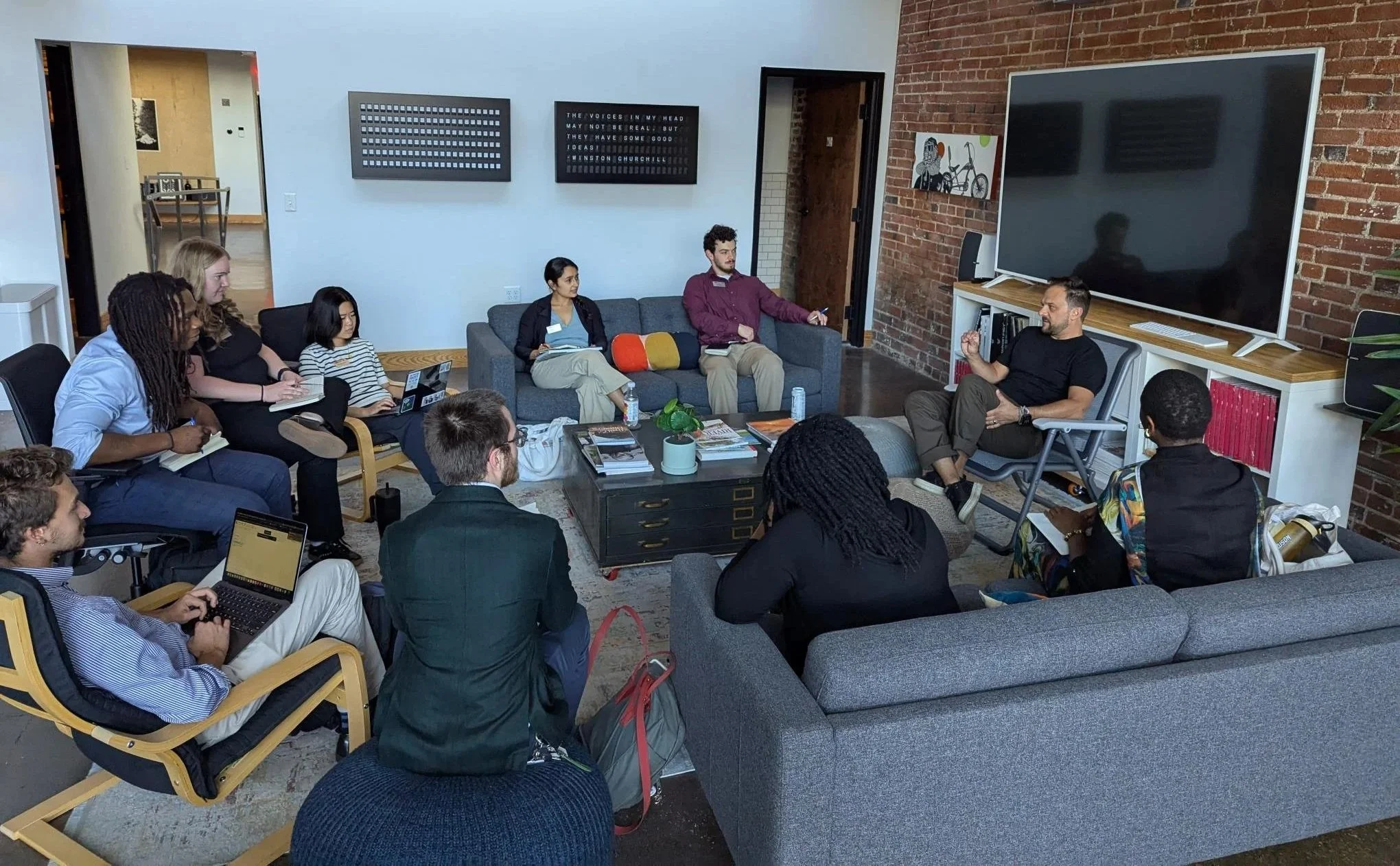
Mission and History
Developing civic leaders in St. Louis since 1974
Coro develops civic leaders by immersing them in rigorous, experiential, community-based leadership training. Coro Fellows are equipped to work effectively across sectors, catalyze systems, and accelerate positive change.
What is Coro?
The original vision for Coro was a program of educational discovery to prepare “citizen leaders” – a new concept at the time of its founding in the early 1940s. Thus, “Coro” — a new word and one without association in the English language — was invented to represent both discovery and exploration. It was meant to convey “to that which readers apply their own meaning.” In 1970, the Coro logo was created by Hisashi Nakamoto. The center part of the “C” is meant to look like an eye to represent the fact that Coro always has its eyes open in public affairs. Yet in spite of being in the center, there is still an opening for exploration and discovery. The “C” also seems to be pointing out in a direction to symbolize a purpose and mission.
Coro Methodology
In its concern for the quality of civic leadership in American democracy and its educational style, Coro’s approach and methodology puts into practice a number of the core tenets of democratic self-governance advocated by the U.S. philosopher John Dewey, who believed that a democratic society of informed and engaged inquirers was the best means of promoting human interests. Further inspired by leaders like Jane Addams and W.E.B. Du Bois, Coro’s ethos is grounded in the belief that impactful change emerges from leaders coming together to innovate and co-create solutions.
This approach has consistently proven its efficacy over more than 75 years of immersive cohort-based experiential learning in which participants grow skills through engaging with real, complex problems facing leaders, organizations, and communities.
Coro centers across the country run a number of nonpartisan leadership training programs – each serving different constituencies at different points of their educational and career paths – to strengthen the democratic process by preparing people for effective and ethical leadership. With a 10,000+ strong network of remarkable leaders who work across differences and ignite change every day, at every level, Coro alumni include United States Senators, elected officials in city halls and state legislatures, and noteworthy leaders in corporate boardrooms, vital institutions, nonprofit organizations, union halls, and beyond.
A Legacy of Leadership
Coro’s National History
Coro was founded in San Francisco in 1942 by W. Donald Fletcher, an attorney, and Van Duyn Dodge, an investment counselor, who met on the Wendell Wilkie presidential campaign. In the aftermath of World War II, the two often conferred on the conditions of public affairs as critical questions were being asked in the United States and across the world about the value of governments being of, for, and by the people.
Fletcher and Dodge opened a small office and began an independent study of processes of citizenship and governance in the United States, engaged in discussions about the political process, researched neighborhoods, observed legislative sessions, and synthesized focus group conversations. Noting a need for training for “more effective citizen involvement and more capable political leadership”, they set out to create a professional training course for public servants akin to that of lawyers or doctors and graduated their first class of Coro Fellows (who were young military veterans) in 1947.
Since 1947, Coro programming has grown to include centers in five cities across the country, including San Francisco, Los Angeles, New York, Pittsburgh, and St. Louis, equipping participants in the leadership skills necessary to assure that our democratic system of government can more effectively meet the needs of its citizens.
Coro in St. Louis
In 1974, the first class of Coro Fellows graduated in St. Louis from Coro’s original home in the region: the Coro Midwestern Center.The Danforth Foundation supported the establishment of Coro in St. Louis when leaders were deeply concerned about the impact of racism on the social, economic, and political landscape of the region and its future, amid a nation grappling with its own history of inequity and mistrust of government.
In its 50 year history in the region, Coro programming in St. Louis has transitioned through different names and homes, including a merger with FOCUS St. Louis after a significant period of time under the name of Coro Leadership Center - St. Louis. From July 2011 through June 2019, FOCUS operated two Coro programs: the Fellows Program in Public Affairs and Women in Leadership, a part-time leadership development program for mid-career women. FOCUS’ decision to discontinue full-time Fellows programming led a team of local, committed Coro Fellows alumni to convene an” Alumni Transition Team” and work to re-home the Coro Fellows Program in the St. Louis region given its significant impact.
Through thoughtful leadership, sustained alumni engagement, committed community partners, and ambitious emerging professionals, the program has endured through the decades with a foundation of inquiry and a commitment to public engagement and the development of future community leaders.
The Coro team at UMSL’s Community Innovation & Action Center is proud to continue the legacy of the flagship Coro program originally conceived over 80 years ago. While many of the issues the program originally sought to address in the region persist in both new and familiar ways, the full-time Coro Fellows Program in St. Louis has equipped more than 500 engaged civic leaders who hold elected office and a variety of public and private sector roles and continue to use their Coro skills daily to challenge these issues and uphold the health of our democracy.
Coro Fellows are challenged to reach beyond the traditional constraints of lectures and books and embrace pragmatist philosopher John Dewey’s charge to learn by doing. They immerse themselves in intensive explorations of current cross-sector issues, gaining first-hand insights through discussions with leaders at the forefront of social change and hands-on placements where they contribute and hone their skills, ultimately developing unparalleled career and personal growth.





